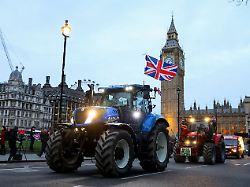“Brexit is a catastrophe”
British farmers protest against EU imports
March 26, 2024, 5:27 a.m
Listen to article
This audio version was artificially generated. More info | Send feedback
Farmers in Great Britain see food imports from the EU as a threat to domestic produce. At a protest in London, farmers are demanding more government protection against cheaper and supposedly inferior goods from the continent. For them, Brexit is the reason for the misery.
British farmers have protested in central London against the import of food negotiated during Brexit. The farmers gathered in front of Parliament with around a hundred tractors from all parts of the country. They carried banners with slogans such as “Support British farmers” and “Brexit is a disaster”. Many feel disadvantaged by the agreements negotiated during Brexit and criticize that food imports would endanger domestic production. “We have had enough,” said organizer Liz Webster from the Save British Farming initiative. She denounced food imports as “inferior.” British products would be “undercut” by imports of foreign goods.
Great Britain left the EU at the end of January 2020. Since then, the UK has signed numerous trade agreements. From the perspective of many farmers, some of the agreements and the lack of import controls result in poorer quality food entering the UK from countries with less stringent regulations. British agriculture accounts for around 60 percent of the food consumed in Britain. However, farmers fear that this share could decrease.
Border controls postponed five times
In fact, the opposite could happen and British imports from Europe collapse. It was only on January 31st that Great Britain introduced border controls for food and plant products from the EU, albeit very late. Whether cheese from Italy, milk from Denmark or pork from Germany – since then, companies and farmers on the continent have had to provide additional documents to prove the origin and quality of their products. London thus took a further step towards Brexit, four years after formally leaving the EU on January 31, 2020. Control is initially limited to paper form. Goods checks will also follow at the border from the end of April.
The British government had postponed border controls five times because it feared the costs and bureaucratic burden involved. Experts expect that the British could face new supply chain bottlenecks or even empty supermarket shelves again. In Great Britain, the House of Commons will be elected this year, probably in the second half of the year. In polls, the governing Tories are well behind the opposition Labor Party.
